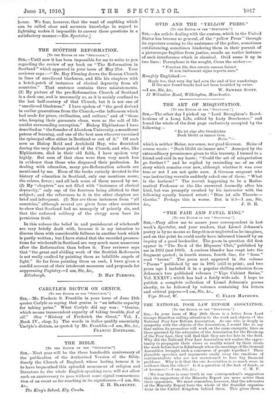THE SCOTTISH REFORMATION.
[To THE EDITOR OF THE " SPECTATOR." J
Sin,—Until now it has been impossible for me to write to you regarding the review of my book on " The Reformation in Scotland " which appeared in your issue of May 21st. Your reviewer says :—" Dr. Hay Fleming draws the Roman Church in lines of unrelieved blackness, and fills his chapters with a hotch-potch of instances of clerical depravity from all countries." That sentence contains three misstatements.
(1) My picture of the pre-Reformation Church of Scotland is a dark one, and is necessarily so, as it is mainly confined to the last half-century of that Church, but it is not one of " unrelieved blackness." I have spoken of " the good derived in earlier generations from the Church,—the influences which had made for p6ace, civilisation, and culture," and of "those who, keeping their garments clean, were as the salt of life amidst surrounding corruption." Bishop Elphinstone I have described as " the founder of Aberdeen University, a munificent patron of learning, and one of the best men who ever exercised the episcopal office either in'Scotland or out of it." Of such men as Bishop Reid and Archibald Hay, who flourished during the very darkest period of the Church, and who, like Elphinstone, died in their old faith, I have spoken very highly. But men of that class were then very much less in evidence than those who disgraced their profession. In dealing with education, many pre-Reformation schools are mentioned by me. Even of the books entirely devoted to the history of education in Scotland, only one mentions more ; the others, fewer ; and all lack some of those named by me.
(2) My " chapters " are not filled with "instances of clerical depravity," only one of the fourteen being allotted to that subject; and the references to it -in the other chapters are brief and infrequent. (3) Nor are these instances from " all countries," although several are given from other countries to show that Scotland had no monopoly of priestly sin, and that the enforced celibacy of the clergy soon bore its pernicious fruit.
In this volume the belief in and punishment of witchcraft are very briefly dealt with, because it is my intention to discuss them with considerable fullness in another book which is partly written ; but I have stated that the recorded prosecu- tions for witchcraft in Scotland are very much more numerous after the Reformation than before it. Your reviewer says that " the great and abiding work of the Scottish Reformers is not really exalted by painting them as infallible angels of light." So far from painting them as such, I have given a candid account of their intolerant measures and proposals for suppressing Papistry.—I am, Sir, &c.,










































 Previous page
Previous page